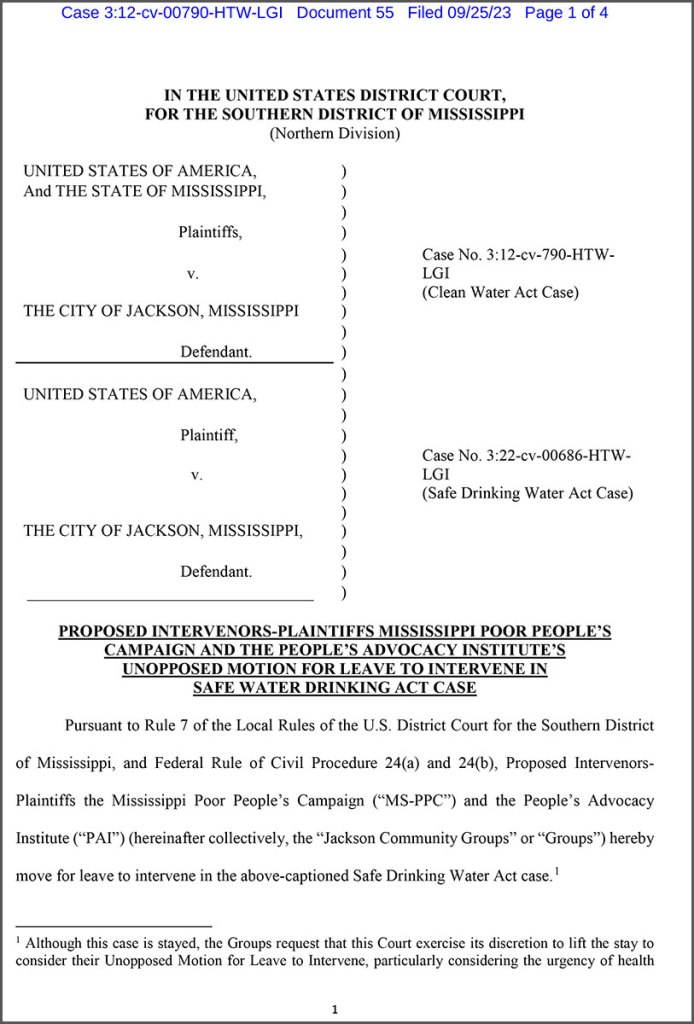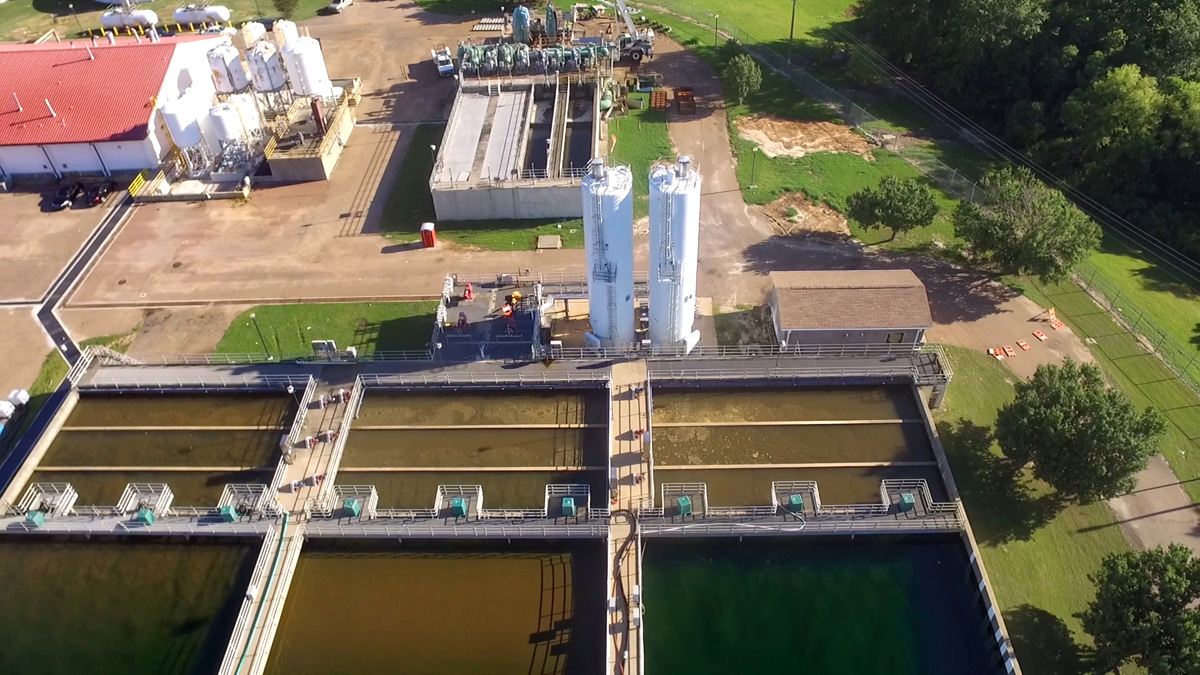The water crisis in my home city of Jackson, Miss., made national news again last year. The cameras have since moved on but residents continue to deal with issues of access to safe water except now, they also face higher bills, declining services and little to no accountability or transparency.
The problem is the private entity JXN Water, which is the court-appointed enshrined interim third party manager, that the Environmental Protection Agency supports. JXN Water has had complete control over Jackson’s water system since its establishment in November 2022. As Jackson residents, we have had enough of unsafe water, precarious infrastructure, and mean-spirited, biased politics that disregard our humanity and deplete our resources.
JXN Water’s Ongoing Lack of Transparency
In early 2021, a severe winter storm damaged Jackson’s main wastewater treatment facility, leading to widespread water service disruptions, especially in working-class areas. The repair efforts were insufficient due to decaying infrastructure and debris. The local conservative leadership’s inadequate response forced Jackson to rely on federal aid. Following the crisis, the Mississippi Rapid Response Coalition, initially a COVID-19 relief group, began providing emergency aid and is now building a platform to address the systemic issues causing the water crisis.
As part of the reforms accompanying the appointment of JXN Water, there is a proposal to use federal funds to retire historical debt of the utility which can be considered a prerequisite for the viability of a privatized management solution. The plan involves a phased approach to upgrade measurement metering devices, increase service rates and upgrade fee collection mechanisms. The economic doctrine driving JXN Water’s approach essentially shifts the burden of the tremendous costs of the infrastructure overhaul directly onto residents.

We already know that market strategies for basic needs like water don’t work. Infrastructure needs public investment, people need water regardless of income, and residents need a say in how we address these challenges. We intend to fight for this to become a reality.
In the almost year-and-a-half since JXN Water’s establishment, community activists have raised concerns that poor communication and a consistent lack of institutionalized community engagement have left residents with poor quality water as well as access issues without a clear sense of the remediation plan.
In September 2023, two members of the Mississippi Rapid Response Coalition—the People’s Advocacy Institute and the Mississippi Poor People’s Campaign—filed a motion to intervene, in their independent capacities, in the ongoing lawsuit between the U.S. Environmental Protection Agency and the City of Jackson. The case rests on the alleged failure to comply with the federal Safe Drinking Water Act. In the face of JXN Water’s ongoing lack of transparency, the organizations seek to ensure an official role for community involvement.
The campaign has worked hard to garner the support of nationally respected organizations such as the Center for Constitutional Rights, Forward Justice, Natural Resources Defense Council and the American Civil Liberties Union of Mississippi. Their support with public advocacy and legal assistance led to the submission of an emergency petition cataloging issues plaguing the water system. In March 2024, federal Judge Henry Wingate granted intervention rights to MPPC and PAI allowing us a voice in the proceedings, one we intend to exercise to the fullest extent.
The story of the water crisis, however, is bigger than Jackson. Infrastructure decay compromises the basic living conditions of Mississippians across the state. Toxic “forever chemicals” (referred to as PFAS, Per- and Polyfluorinated Substances) have been found in drinking water across the state with contamination surpassing recommended limits. Excessive PFAS exposure has been linked to increased likelihood of a range of health issues including cancer, birth defects, kidney disease, liver problems and increased risk of asthma.

In August 2023, Consumer Reports led a study that tested water samples from 149 physical sites across 82 counties in Mississippi and found traces of lead, arsenic and PFAS across the sites with very poor results in counties in Corinth, Vaiden and Hattiesburg. The concerning levels of contamination in MIssissippi’s water may soon come under scrutiny, as the EPA proposed a new set of regulations through the National Primary Drinking Water Regulation in March 2023.
The NPDWR includes the first federal limits to PFAS, and other specific chemical contaminants found in drinking water. Today, the extent of the risk facing residents across the state remains unclear due to lack of testing and negligence in the management of water services, posing a significant public health risk. It is clear that a massive investment in the state’s infrastructure is going to be necessary in order to comply with tightening safety requirements for drinking water.
Committed to Securing Safe Water for Jacksonians
Given the state’s record of denying funds to Jackson, residents are forced to pin their hopes on federal funding such as the bipartisan spending bill and the proposed Build Back Better Act, touted as potential sources for infrastructure improvements. However, the allocated $800 million for water improvements in Mississippi falls woefully short of the $2 billion needed in Jackson alone.
Clearly, the state is not waiting for the lawsuit to be resolved to grab for city resources. Senate Bill 2628, also known as the “Mississippi Capitol Region Utility Act” proposed significant changes to the management of Jackson’s water system. It would have transferred control from JXN Water to a newly formed entity, the Mississippi Capitol Region Utility Authority, with the Governor and Lieutenant Governor appointing the majority of the board members.
This attempted transition jeopardized the voice of Jacksonians in water system governance, sidelining local elected leaders and disregarding public input. Moreover, the proposed framework grants rate-setting powers to the appointed board, effectively bypassing the oversight of the city. The implications extend beyond mere control—They encompass assets valued in the tens of millions and the $600 million federal appropriations earmarked for the city that would essentially move to state control.

The Mississippi State Legislature’s white, extremist majority continues to launch attempts to siphon power and federal funds away from the city. first with Senate Bill 2889 and most recently with Senate Bill 2628 and the help of JXN Water, to “regionalize” Jackson’s resources. Thankfully these bills died, but I’m sure it won’t be the last attempt to undermine local governance.
On March 2, 2024, activists rallied under the Poor People’s Campaign at the Capitol to advocate for a comprehensive “Third Reconstruction” plan, addressing issues including demands for a living wage as well as access to clean water, air, healthcare, and the provision of affordable housing.
Several weeks later, we joined water campaigns from across the South in delivering testimonials to the United Nations Special Rapporteur on Racism in reverence of World Water Day, elevating our stories at an international level.
We understand that securing safe drinking water extends beyond courtrooms and statehouses. With or without cameras, we’re mobilizing to the streets, spanning across our state, the nation and even globally. Our campaign is committed to persisting for as long as necessary, going wherever needed, to ensure our community receives the safe water and quality infrastructure it deserves.
This MFP Voices essay does not necessarily represent the views of the Mississippi Free Press, its staff or board members. To submit an opinion for the MFP Voices section, send up to 1,200 words and sources fact-checking the included information to azia@mississippifreepress.org. We welcome a wide variety of viewpoints.






